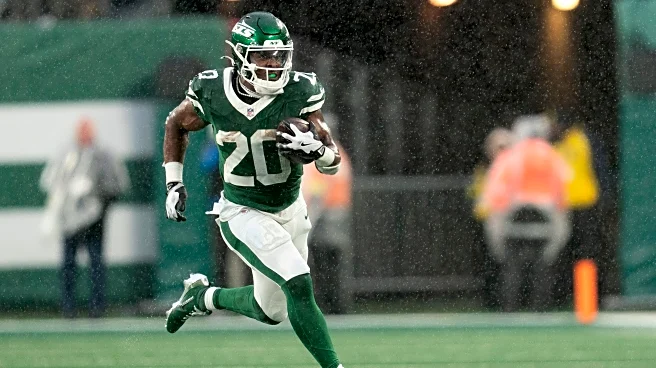As you likely know, the Jets were very active at the trade deadline, dealing star defenders Quinnen Williams and Sauce Gardner.
It drew less attention, but Breece Hall, who was perhaps the Jets player most
subject to trade rumors heading into the deadline, remains with the team. Hall is set to become a free agent at the end of the season.
We might presume this is a sign the Jets want to keep Hall. If they had no intention of re-signing him, it would have made sense to trade him in a lost season and get something in return rather than letter him walk for nothing in a few months.
Of course these decisions come down to dollars and cents. If the Jets want to keep Hall, they need to find a contract that works for both player and team. A deal needs to make sense for both sides.
I would argue that the Jets’ moves at the deadline changed the definition of what makes sense for the Jets.
Prior to dealing Gardner and Williams, the Jets had a foundation of stars in their prime they were building around, Garnder, Williams, and Garrett Wilson. Gardner and Wilson just got big money extensions a few months ago. Williams would have required an extension soon if the team was going to keep him.
It’s a pretty common (and common sense) way to build your team. Use star players as your foundation. You have to pay for quality to get quality in this league so these players are almost always expensive.
Of course the NFL has a hard salary cap. So if you pay your top end guys handsomely, there is a limited budget for the rest of your team. You generally need to set a hard limit on what you spend on most other players, particularly those are low value positions like running back.
Under a team building model like this, the Jets could conceivably keep Breece Hall but only at a reasonable price. Otherwise the Jets would risk not having resources for the rest of their team.
The trade deadline activity changed everything. Two of the three big money Jets players are now gone. The team is also flush with high Draft picks over the next two years. Those picks will give the team the potential to add multiple star level talents, but these players will be on inexpensive rookie contracts the first four years of their careers.
The Jets no longer have expensive veteran players aside from Wilson. Unloading the contracts of Williams and Garnder also created a mountain of salary cap space.
The Jets will need to spend quite a bit of that cap space in the years ahead. Through this process the Jets have gone from one extreme to another. The Jets currently have $100 million in dead money counting against their salary cap. That is the result of their strategy in 2023 and 2024 to borrow future resources in a failed attempt to load up around Aaron Rodgers (and to be fair also partially the cost of doing business to complete the trades they made at the deadline). The four biggest salary cap hits the Jets currently have are on players no longer on the team. That lack of cap flexibility in 2025 is why you saw the team so unable to make moves last offseason.
Going forward, with so few players on long-term commitments the Jets are in the opposite boat. It’s going to be impossible for the Jets to spend all of that cap on value contracts. They are going to have to overpay players.
The question is what the team prioritizes in its overpays.
The trade deadline strategy could offer some insight. While the Jets did deal Gardner and Williams, they held onto Garrett Wilson. Wilson is, of course, the only one from that group who plays offense.
A team with no long-term solution at quarterback is likely to draft a quarterback soon, particularly with all of the excess picks.
I would guess the Jets held Wilson because they understand how valuable he can be in supporting a young quarterback.
Hall is another player who can help a young quarterback out. We can debate how good Breece Hall is. Is he elite? Should he be an every down back, or would he be better in a platoon?
I think we can all agree he’s a big play threat who would be an asset to a young quarterback.
Of course there’s always a price point at which a player ceases to make sense no matter the situation. But I would argue the new Jets strategy has raised the price at which Hall makes sense for the Jets quite a bit.
In fact I would say that if the primary goal is to support a young quarterback, it would be difficult for a team with the amount of cap space the Jets have to justify allowing a player with Hall’s talent walk out the door (barring some sort of serious injury over the last eight weeks of course).
The Jets have chronically failed to develop quarterbacks. The reasons for this are numerous. Among them is the team’s chronic inability to put the right pieces around the quarterback. Seven years ago the Jets were in a similar spot, knowing they would pick a quarterback and loaded with cap space. They prioritized an overpay to a cornerback, Trumaine Johnson, rather than a wide receiver, Allen Robinson.
Of course there were other factors making that decision foolish, namely Johnson’s productive days being over. Still, it’s tough to look at the success Sam Darnold is having and wonder what might have been had the Jets done a lot differently in prioritizing putting the right pieces around him (and Robinson was only the tip of the iceberg).
At least in these early days, it seems like the Jets have leadership that appreciates the need to put the right pieces around a young quarterback. If so, Breece Hall could be with the Jets well past this season.









